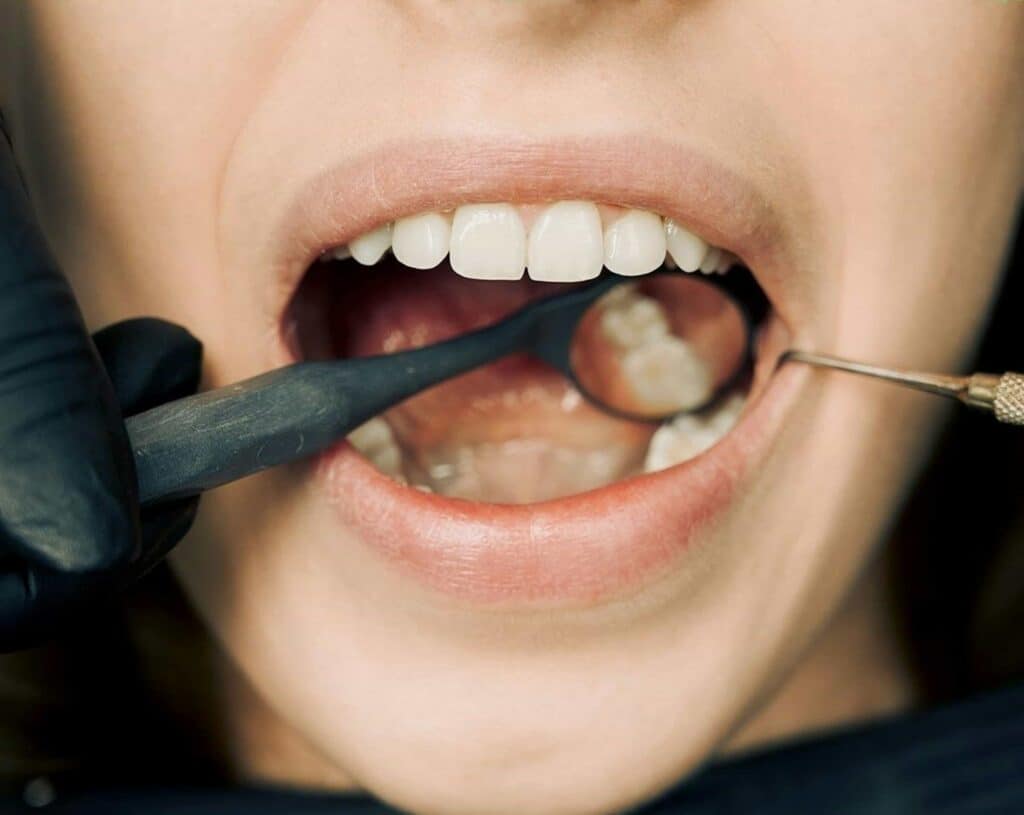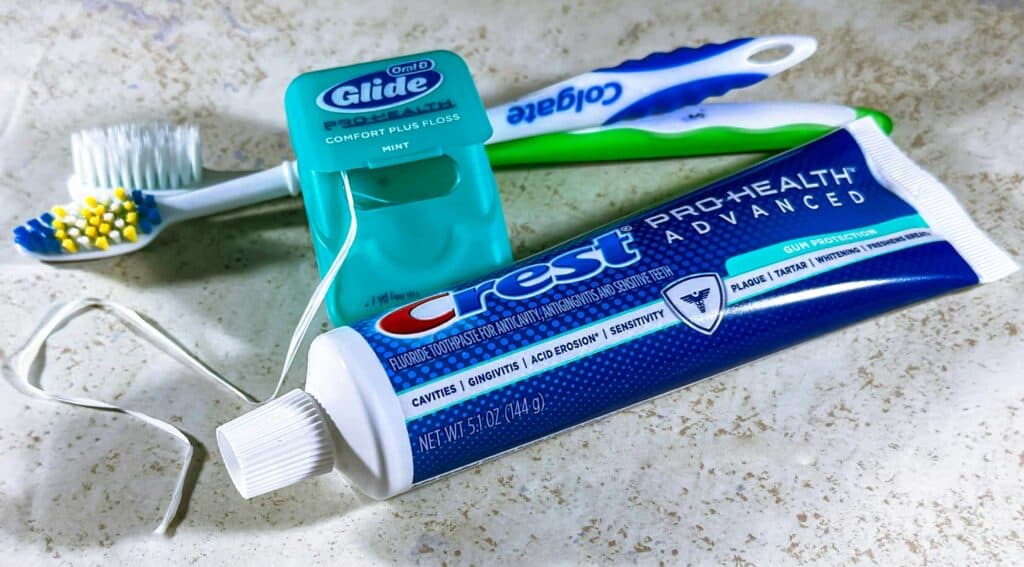Plaque plays a significant role in oral health, and understanding its causes and effects is essential to maintaining a healthy smile. If you’ve felt a sticky, fuzzy film on your teeth, especially when you’ve skipped brushing, you’ve encountered plaque on your teeth.
It’s more than just a nuisance; it’s directly linked to cavities and gum disease. Neither of which should be taken lightly!
With that being said, here’s everything you need to know about what causes plaque on teeth, how it forms, and how you can prevent its buildup.
Key Takeaways
- Plaque is a sticky, colorless film of bacteria that forms on teeth and can lead to serious oral health issues if not managed properly.
- Common causes of plaque buildup include poor oral hygiene, diets high in sugars and carbs, dry mouth, irregular dental cleanings, smoking, and crowded teeth.
- Untreated plaque can result in cavities, gum disease, tartar buildup, and persistent bad breath.
- Preventing plaque involves consistent oral hygiene habits like brushing twice a day, flossing daily, staying hydrated, and reducing sugary and starchy foods.
- Regular dental visits are crucial for removing hardened plaque (tartar) and addressing potential oral health problems early.
- By maintaining healthy habits and scheduling professional cleanings, you can protect your teeth and enjoy a healthier, brighter smile for life.

What is Plaque?
Plaque is a sticky, colorless layer of bacteria that constantly forms on your teeth. It feels like a fuzzy coating and thrives when oral hygiene routines aren’t properly maintained. Left untreated, plaque can harden into tartar, which requires professional dental removal.
But how does plaque get there in the first place?
To fully understand, we need to examine how plaque forms and the habits that contribute to its buildup.
How Does Plaque Form?
Plaque is a natural process, but it is accelerated by our dietary habits and oral hygiene. It begins when leftover food particles combine with bacteria in your mouth.
These bacteria feed on carbohydrates and sugars, creating acids that cling to the enamel of your teeth. Over time, these acids can erode enamel and damage the structure of your teeth, causing decay.
Additionally, plaque can extend to your gums and lead to inflammation or gum disease like gingivitis.
Foods That Fuel Plaque Formation:
- Sugary foods like candy, cookies, or baked goods
- Starchy foods like bread, rice, and pasta
- Soft drinks, sports drinks, and other sugar-laden beverages
- Snacks that stick to teeth, such as raisins or dried fruits
What Causes Plaque Buildup on Teeth?
While plaque formation is natural, certain behaviors and conditions can accelerate its buildup:
- Poor Oral Hygiene: Skipping regular brushing and flossing leaves food debris in your mouth, allowing plaque to thrive.
- Diet High in Sugars and Carbs: The bacteria in your mouth feed on sugars and starches, producing acids that create plaque.
- Dry Mouth: Saliva is your mouth’s natural defense against plaque, helping to wash away bacteria and food debris. A decrease in saliva production (due to dehydration, certain medications, or health conditions) can allow plaque to accumulate faster.
- Irregular Dental Cleanings: Even with good daily oral hygiene, general dentistry such as teeth cleanings is critical for removing hardened plaque, known as tartar.
- Smoking or Tobacco Use: Tobacco products reduce saliva flow and create a favorable environment for plaque bacteria to thrive.
- Crowded or Misaligned Teeth: Overlapping teeth make it easier for plaque to hide, as it may be harder to clean these areas effectively.
Why is Plaque Dangerous?
Plaque may seem harmless at first, but it can lead to serious oral health issues if left unchecked. Understanding the dangers associated with plaque highlights why maintaining good oral hygiene practices is crucial.
If left untreated, plaque can lead to several oral health issues such as:
- Cavities: The acids produced by bacteria erode your tooth enamel, resulting in tiny holes that grow into cavities.
- Gum Disease (Gingivitis): Plaque around the gumline irritates the gums, causing redness, swelling, and bleeding. If untreated, it can lead to more severe gum disease (periodontitis).
- Tartar: Plaque can harden into tartar, making it even harder to remove and leading to further complications.
- Bad Breath: Bacteria in plaque produce foul-smelling compounds, leading to persistent bad breath.
Prevention Tips for Plaque Buildup
While plaque is a natural occurrence, it is manageable with the right habits and dental care.
Here are some tips to keep your teeth clean and prevent plaque buildup:
Brush Your Teeth Properly
Brush at least twice a day using fluoride toothpaste, ensuring you clean along the gumline and all surfaces of your teeth. Use a soft-bristled brush to avoid damaging enamel.
Brushing your teeth properly is essential to remove plaque and prevent its buildup.
Floss Daily
Flossing helps clean between teeth and removes food particles that may be trapped, preventing plaque formation in hard-to-reach areas.
When you floss, make sure to target each tooth and curve the floss around it in a C-shape.
Limit Sugary and Starchy Foods
Reducing your intake of sugary and starchy foods can help decrease the amount of acid produced by bacteria in your mouth. Instead, opt for healthy snacks like fruits, vegetables, and nuts.
Limiting sugary and starchy foods not only prevents plaque buildup but also promotes overall health.
Stay Hydrated
Drinking plenty of water helps keep your mouth hydrated, promoting saliva production and washing away food particles that can contribute to plaque formation.
Avoid sugary drinks and opt for water whenever possible.
Visit Your Dentist Regularly
Regular visits to your dentist are crucial for removing hardened plaque (tartar) and identifying any potential oral health issues before they become more severe. Aim for bi-annual checkups or as recommended by your dentist.
You can keep plaque at bay by following good oral hygiene practices and making smart dietary choices.

FAQ
Q: How do I know if I have plaque on my teeth?
A: Plaque is usually visible as a fuzzy, colorless layer on your teeth. If left untreated, it can harden into tartar, which may appear yellow or brown.
Q: Can plaque cause other health issues besides oral health problems?
A: Yes, there is evidence that gum disease (caused by plaque buildup) can lead to an increased risk of heart disease and stroke.
However, more research is needed to fully understand this connection.
Q: Are there any natural remedies for preventing plaque buildup?
A A few natural remedies may help prevent plaque buildup, such as rinsing with mouthwash containing essential oils or chewing sugar
Maintaining a Healthy Smile for Life
Understanding what causes plaque on teeth is the first step toward maintaining optimal oral health. By recognizing the role of diet, oral hygiene, and regular dental visits in plaque formation, you can take meaningful steps to protect your teeth and gums.
Plaque may be a natural occurrence, but with proper brushing, flossing, and healthy lifestyle choices, you can minimize its impact and preserve your smile for years to come.
Sometimes, plaque can be stubborn even with diligent brushing and flossing. Regular professional cleanings help remove plaque and tartar, and they keep your teeth and gums in top shape. Contact 5 Mile Smiles at 509-326-2621 to book your next cleaning today. After all, a happier, plaque-free smile is just a call away


